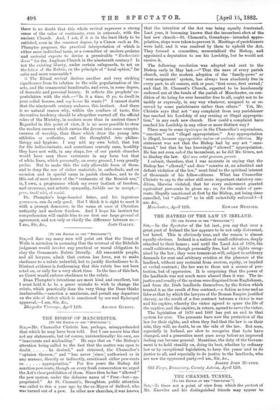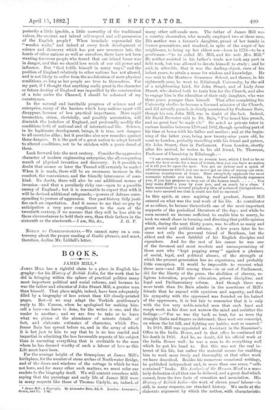THE CHANNEL TUNNEL.
[To THE EDITOR OF THE " SPECNAT01/.1
SIR,—Is there not a point of view from which the protest of Mr. Knowles and his distinguished friends may appear to posterity a little ignoble, a little unworthy of the traditional valour, the ancient and inbred self-respect and self-possession of the English people ? When ironclads superseded the "wooden walls," and indeed at every fresh development of science and discovery which has put new resources into the hands of other nations as well as ourselves, there have not been -wanting timorous people who feared that our island home was in danger, and that we should lose much of our old power and influence. But "God fulfils himself in many ways," and the position of England relatively to other nations has not altered, and is not likely to suffer from the modification of mere physical conditions, so long as her people are true to themselves. For my part, if I thought that anything really great in the character or future destiny of England was imperilled by the construction of a tube under the Channel, I should be ashamed of my -countrymen.
In the natural and inevitable progress of science and of enterprise, many of the barriers which keep nations apart will -disappear, because of less practical importance. More rapid locomotion, steam, electricity, and possibly aerostation, will diminish the isolation of England, and profoundly modify the conditions both of national and of international life. Science, in its legitimate development, brings, it is true, new dangers to all countries alike; but it provides also new remedies against those dangers. It is the part of a great nation to adapt herself to altered conditions, not to be stricken with a panic dread of them.
Look forward into the next century. Consider the aggressive -character of modern engineering enterprise, the all-conquering march of physical invention and discovery. Is it possible to -doubt that sooner or later the Tunnel will certainly be made ? When it is made, there will be an enormous increase in the -comfort, the convenience, and the friendly intercourse of man- kind. No doubt, there will also be one additional means of invasion—and that a peculiarly risky one—open to a possible -enemy of England ; but it is reasonable to expect that with it will be devised additional safeguards,—powers of defence corre- sponding to powers of aggression. Our past history fully justi- fies such an expectation. And it seems to me that we pay by anticipation a very poor compliment to the men of the twentieth century, if we assume that they will be less able in these circumstances to hold their own, than their fathers in the sixteenth or the nineteenth.—I am, Sir, &c., J. G. F.



































 Previous page
Previous page